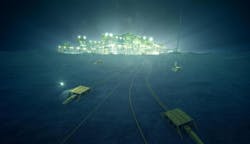BP awards Aker more long-term agreements
Offshore staff
FORNEBU, Norway – BP has awarded Aker Solutions two five-year framework agreements for its operated oil and gas fields worldwide. Both came into effect this August.
The first covers engineering, procurement, and construction ofsubsea production systems for new and maturing developments.
Aker Solutions would bid for work under the contract, which sets out the terms and conditions that would need to be met.
The two companies also agreed on a servicing agreement to coincide with any equipment delivered under the first contract and to support previously installed subsea hardware.
Luis Araujo, CEO of Aker Solutions, said: “This further expands our long-standing relationship with BP, which spans more than 20 years.”
For both contracts, the size of the framework agreements depend on the amount of work needed.
RecentlyAker Solutions teamed up with Aker BP, the new Norwegian super-independent, and Subsea 7. They plan to form an alliance under which one integrated team with specialists from each company works on the most cost-effective solutions for Aker BP’s subsea developments in Norway.
The goal is to enable continuity and a re-use of solutions and technology to lower costs, reduce development time, and promote safer, more efficient work methods. All parties will share both risks and rewards.
Aker Solutions provides experience in front-end engineering, brownfield modifications and subsea systems with Subsea 7’s subsea umbilicals, risers, and flowlines capabilities and Aker BP’s exploration and production expertise.
According to Aker Solutions’ latest results statement, there are some signs of a recovery in the offshore industry, mainly in the brownfield segment, with oil prices likely to stabilize at a higher level in 2017.
Cost-cutting is having an impact, the company adds, with project break-even costs coming down while contractors strive to simplify field architecture and form more effective collaboration models.
This should help the industry move forward with new investments, leading to an increasing number of projects up for sanction over the next 12 months. It applies especially true for brownfield projects as the industry seeks to extract additional value from existing assets and infrastructure.
10/28/2016
